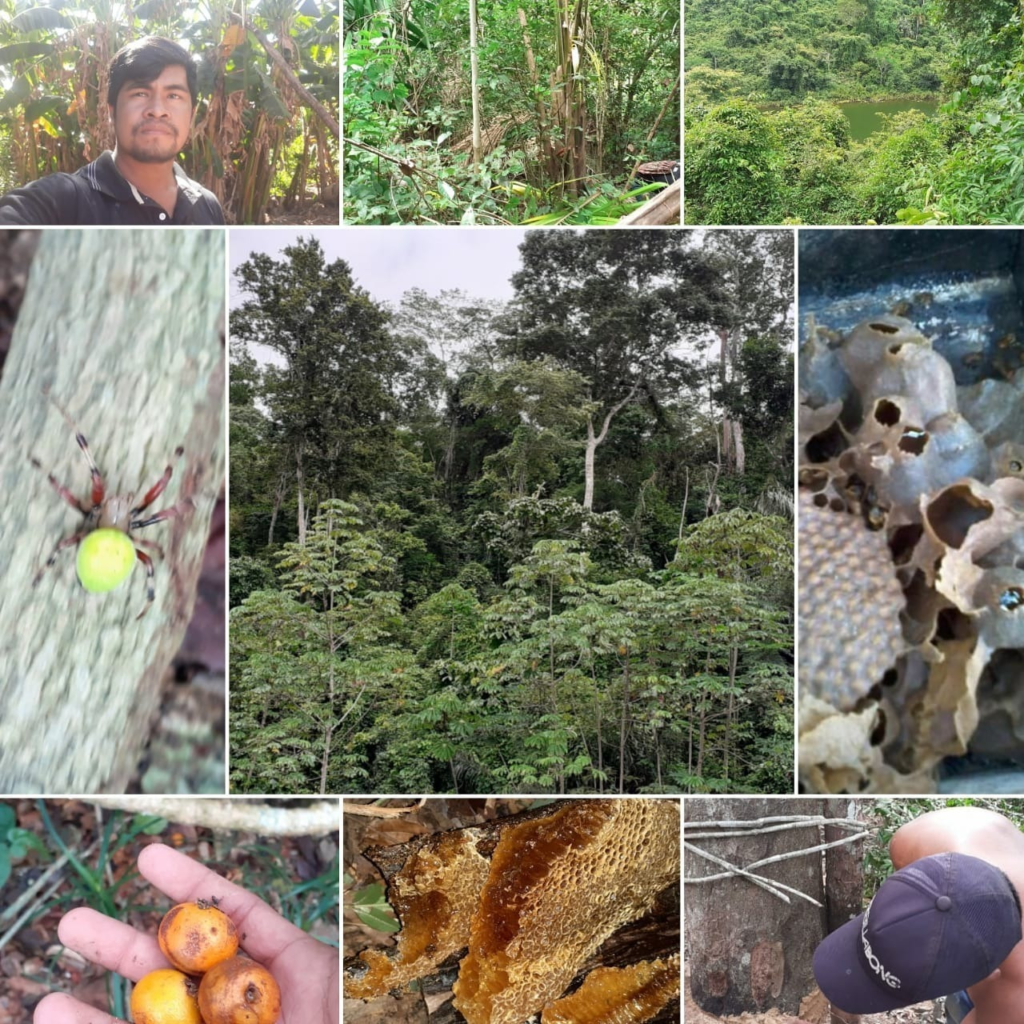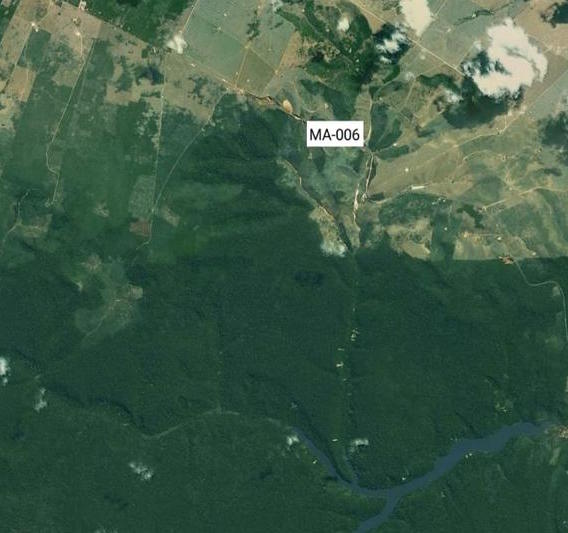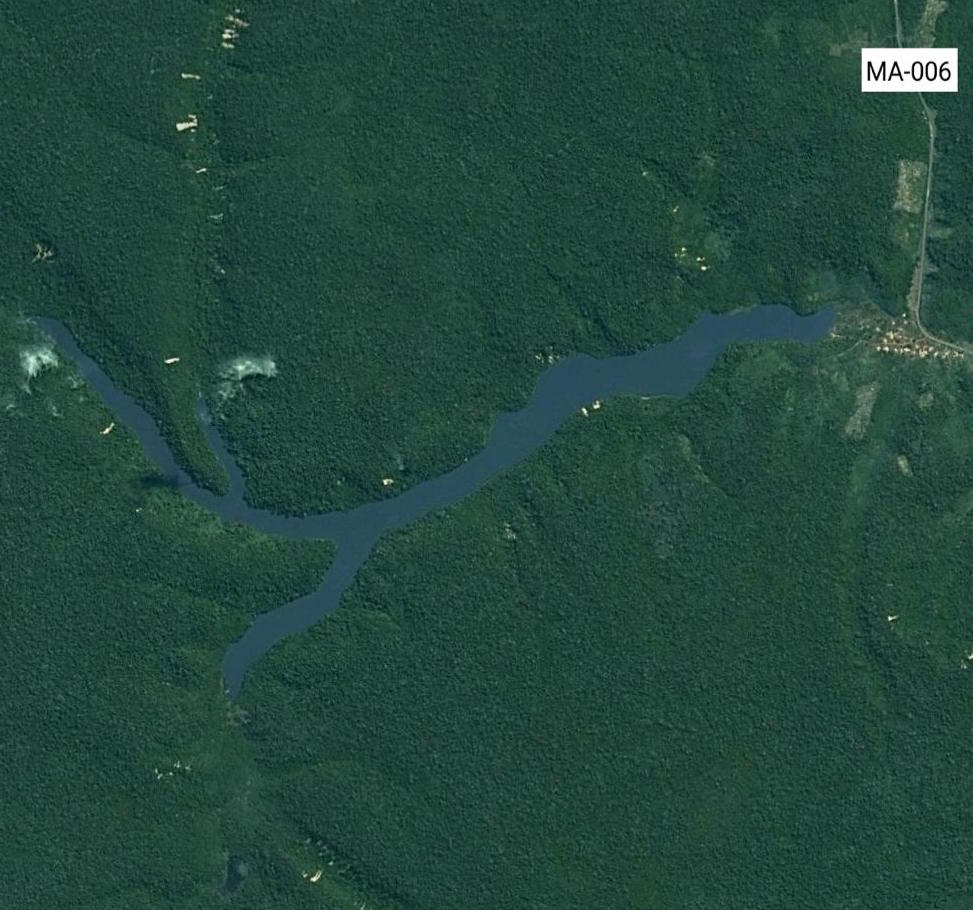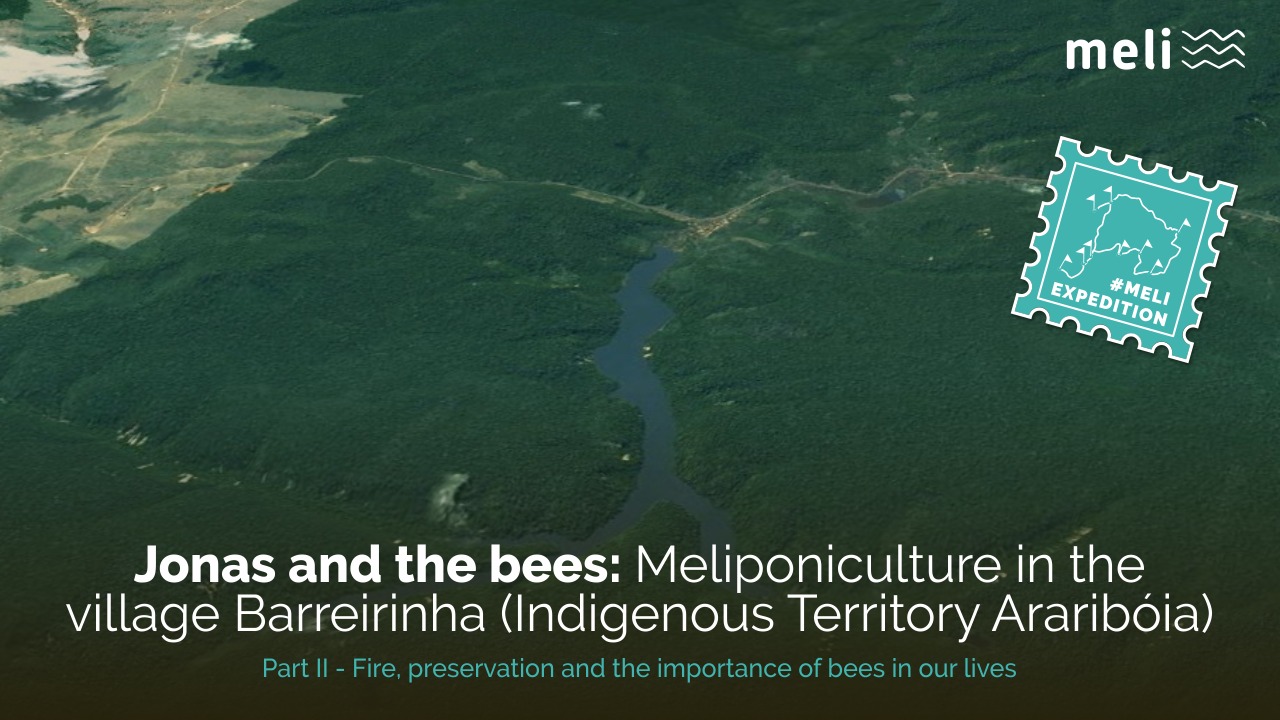After having shared with you in the first part of my story on how I came to keep bees, I would now like to tell you why the bees are so important for our region and our lives!
Author: Jonas Guajajara
Leia em Português. Auf Deutsch lesen.
Our home, the indigenous territory Araribóia, bursting into flames
The year 2015, the year in which we completed the course of Agroecology at IFMA, was the same year in which the IT (Indigenous Territory) Araribóia burst into flames. The fire spread, burning everything in its path, burning our relatives’ houses, fallow land, animals, etc. The entire biodiversity of immense forests. The fire threatened all of the area and we were also very concerned about our isolated relatives, the Awá-Guajás, who live in the middle of the rainforest on the reserve and who are more dependent on the forest. It was therefore necessary to mobilize the authorities, the firefighters, the Forest Fire Prevention Service (Prevfogo), the Guardians of the Forest and the army to provide help in fighting the fires. The leaders requested assistance from the authorities and this was provided.
“The Awá-Guajás, who live in the middle of the rainforest on the reserve […] are more dependent on the forest.”
At that time, I was living in the indigenous village of Zutiua, where I spent more than a year and where I saw everything that was happening during that very sad year. The fire-brigade, as everyone who was involved in fighting the fire, made a huge effort.
.
The consequences of the fire and my decision to help fight it
I was thinking about what contribution I could make and about the consequences that would arise from the fire, so I decided to offer my help, even though I was quite insignificant. But I wanted to help, because this land is my home and it was catching fire. Araribóia is our big house and I could not just stand there and watch it burn down. I therefore decided to go out together with the firefighters; lives were in danger and the best thing I could do was to go and join the struggle, to go out together with the firefighters and put out the flames. More than 50% of the forest on the reserve was lost, we suffered such a great loss, the reserve being so rich in biodiversity. Half of it was burned up, this was a very sad event in the history of Araribóia.
“Araribóia is our big house and I could not just stand there and watch it burn down.”
This fire may have been caused by illegal logging; by illegal hunters who often leave fires still burning in their tents or huts, which then spread to the forest itself; or due to lack of knowledge about the instructions for safe use of fire during the burning-off of fallow land (the clearing around the fallow land).
.
Preserving our environment with the cultivation of bees
Our relatives had already witnessed a similar event in the forest, where the huts had been abandoned and fires caused there by illegal hunters; doesn’t this fit into this scenario? Yes, it does, so that what happened in the past is not repeated, such as the great forest fire in the reserve. All of this gives us reason to put into practice our work on the cultivation of bees, to show that it is important to take care of the little that still remains of the forest, to protect it. The Guardians are doing their work in monitoring the territory, carrying out protection work but being threatened by this at the same time, because they are preventing intruders from entering the reserve.

“It is important to take care of the little that still remains of the forest, to protect it.”
We all know that the animals, both small and large, are not able to protect themselves, they are defenceless. But we human beings are able to help and we must be conscious of this, all of us generally. We can help by working towards raising consciousness, by showing examples by means of talks and presentations, etc. By helping those who are interested in cultivating these small bees; our relatives are thirsting to find out how to further develop their cultivation work. To learn how to handle it. Here in Barreirinha (indigenous village) we have made a start on this work, but we need to develop our cultivation efforts further. The bees themselves are no problem, and we also have dry wood; we can make good use of all these. We have various types of bees that we find in dry logs, but what we are lacking is the material for making properly designed hive boxes, and the boxes are very expensive in the furniture stores. But we are moving forward in our work.
“But us human beings, we are able to help and we must be conscious of this, all of us generally.”
There is still enough rainforest, and there have been few fires, but each year that passes the fire moves along the edges of the MA-006 road, which passes through the reserve, burning the trees at the side of the road. The openings caused by the branches being chopped away by the woodcutters makes it easy for people to enter the forest, and then what I said above happens, i.e. fires can be started by the people.
Our relatives who cultivate fallow land are conscious of this and, after the great forest fire, we have to be even more aware that it is important to make a clearing around the fallow land. This work has already been started by the Forest Fire Prevention Service in the regions. However, the reserve is large and it is difficult to access other indigenous villages. Nevertheless, they are continuing to do excellent work, making those who use the fallow land aware of the need to make a clearing around it beforehand, on the day of the burning, or to inform the Forest Fire Prevention Service and/or the Guardians and ask them to help with the burning of the fallow.
.
The contrasting effects of Meliponiculture and unsustainable practices in Araribóia
Our region is still a relatively well conserved area and we have a lake in the vicinity, some 14 km from Barreirinha, the largest lake in Araribóia. There are several stories about this lake and about the riparian forests that help to sustain the lake. Animals such as birds, fish etc. and the fruits of the bacaba, buriti and jugara palms.

What we are frightened of is that this big lake, full of life, will become contaminated by chemical substances. Close to the lake, one or two kilometres away, there is a large soy plantation belonging to major companies, who scatter poison in order to combat the crop pests. These toxic substances may negatively affect animals living there and the pollinizing insects, and even harm the residents of the village in the vicinity of the lake.

“What we are frightened of is that this big lake, full of life, will become contaminated by chemical substances.”
I have strong faith in the work of stingless beekeeping, since as from the moment in which one starts to cultivate and live together with the Meliponini bees, there arose a desire to reforest degraded areas, to produce seedlings, to restore the springs, to do it all for the bees and the communities, to collect fruit and even sell the pulp of the fruit in the future.
We still possess these treasures in all of Araribóia. We do not need to cut down the forest in order to obtain our foodstuffs on a large scale or to enrich ourselves over and above this. Were we to do this, we would be taking away a part of the forest that would be difficult to restore. Money can be made in a few minutes but the forest requires a lot of time for it to return to its original state. We are able to produce many things in a small space, carrying out sustainable work and obtaining high-quality food without using chemical substances.
The plans for Araribóia are many; what we have to do is take them away from the paper and put them into practice.
“Money can be made in a few minutes but the forest requires a lot of time for it to return to its original state.”
.
Joining different types of knowledge to achieve more with Meliponiculture
The indigenous hunters know a great deal about bees, they know the names of each species of bees in the indigenous languages, how the bees behave and what they are used for. These relatives really do know their bees, but we have to make a little push towards helping them. They have knowledge that I myself did not know until now, but we are gradually discovering things together. Mutually exchanging knowledge, bringing together our two areas of knowledge so that we can achieve our objectives together. We help the bees, and they offer us their products such as: honey, pollen, propolis and much more! We have enough trees that give flowers and fruits. We can take advantage of collecting the seeds at the right time for each one, produce seedlings from them and plant them at places where that type of plant no longer exists. The bees will be most grateful for this, giving us their products in return.
“Mutually exchanging knowledge, bringing together our two areas of knowledge so that we can achieve our objectives together.”
.
What Meliponiculture means to me
We do things that the bees are not able to do, and they do things that we are not able to do (we protect the bees against predators, observe and correct, while they pollinate our plantations and make our medicines and honey).
By means of them we obtain our nourishment, work to the benefit of our relatives and guarantee high-quality food on our table.
When we talk about stingless beekeeping (Meliponiculture) we are also talking about:
– Looking after the forest
– Producing seedlings
– Reforesting
– Saying “no“ to chemical products
– Products made by the bees
– Marketing
– Development
I express my thanks to all the team of Meli, who are carrying out important work with the stingless beekeepers in three states. I also thank everyone who is supporting me, such as my relatives, who have always believed and continue to believe in this work.
“From the moment in which we started to cultivate and live together with the Meliponini, there arose that desire to reforest degraded areas, […], to do it all for the bees and the communities”
Your donation can have a positive impact on the world!
Subscribe to receive our Newsletter!
Find us also at Linkedin, Facebook, Twitter or Instagram
www.meli-bees.org
❤️


3 Replies to “Jonas and the Bees – Part II: Fire, preservation and the importance of bees in our lives”